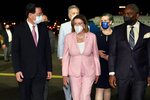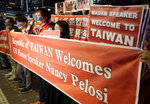

TAIPEI, Taiwan (AP) — U.S. House Speaker Nancy Pelosi arrived in Taiwan on Tuesday night despite threats from Beijing of serious consequences, becoming the highest-ranking American official in 25 years to visit the self-ruled island claimed by China.
Pelosi’s visit has triggered increased tension between China and the United States. China claims Taiwan as part of its territory, to be annexed by force if necessary, and views visits by foreign government officials as recognition of the island’s sovereignty.
China had warned of “resolute and strong measures” if Pelosi went ahead with the trip. China’s Defense Ministry said Tuesday night it will conduct a series of targeted military operations to “safeguard national sovereignty” in response to Pelosi’s visit. It vowed to “resolutely thwart external interference and ‘Taiwan independence’ separatist attempts."
Chinese Foreign Minister Wang Yi said Washington's betrayal “on the Taiwan issue is bankrupting its national credibility."
“Some American politicians are playing with fire on the issue of Taiwan," Wang said in a statement. “This will definitely not have a good outcome ... the exposure of America's bullying face again shows it as the world's biggest saboteur of peace."
Pelosi said in a statement just after her arrival that the U.S. delegation’s visit “honors America’s unwavering commitment to supporting Taiwan’s vibrant democracy.”
“Our visit is one of several Congressional delegations to Taiwan -– and it in no way contradicts longstanding United States policy,” she said.
The plane carrying Pelosi and her delegation left Malaysia earlier Tuesday after a brief stop that included a working lunch with Prime Minister Ismail Sabri Yaakob.
Barricades were erected outside the Grand Hyatt Hotel in Taipei where Pelosi was expected to stay amid heightened security. Two buildings in the capital lit up LED displays with words of welcome, including the iconic Taipei 101 building, which said “Welcome to Taiwan, Speaker Pelosi.”
Shortly after Pelosi’s arrival, a representative of the Chinese legislature’s Standing Committee issued a statement saying the trip “severely violated” the “One China principle,” which is Beijing’s claim to be the sole government of both mainland China and Taiwan.
China’s military threats have driven concerns of a new crisis in the 100-mile-wide Taiwan Strait that could roil global markets and supply chains.
The White House on Monday decried Beijing's rhetoric, saying the U.S. has no interest in deepening tensions with China and “will not take the bait or engage in saber rattling.”
White House National Security Council spokesperson John Kirby underscored that the decision to visit Taiwan was ultimately Pelosi’s. He noted that members of Congress have routinely visited the island over the years.
Kirby said administration officials are concerned that Beijing could use the visit as an excuse to take provocative retaliatory steps, including military action such as firing missiles in the Taiwan Strait or around Taiwan, or flying sorties into the island’s airspace and carrying out large-scale naval exercises in the strait.
“Put simply, there is no reason for Beijing to turn a potential visit consistent with long-standing U.S. policy into some sort of crisis or use it as a pretext to increase aggressive military activity in or around the Taiwan Strait,” Kirby said.
Pelosi is to travel to Japan and South Korea later this week.